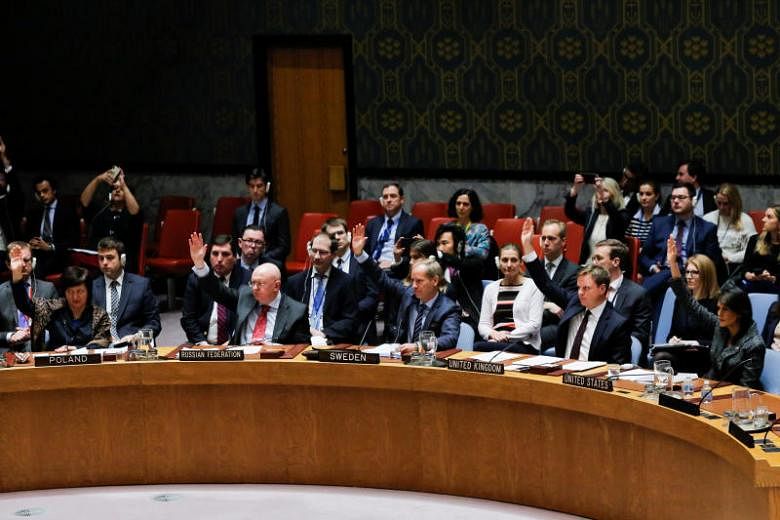UNITED NATIONS (AFP) - The UN Security Council on Saturday (Feb 24) unanimously demanded a 30-day ceasefire in Syria, as new air strikes on the rebel enclave of Eastern Ghouta took the civilian death toll from seven days of bombing to more than 500.
With support from Russia, the Security Council approved a resolution calling for a ceasefire "without delay" to allow for humanitarian aid deliveries and medical evacuations.
At least 127 children are among the 513 dead in the bombing campaign that the regime launched last Sunday on Eastern Ghouta, just outside Damascus, the Syrian Observatory for Human Rights said. The Britain-based monitor of the war said at least 35 civilians were killed in Saturday's strikes, including eight children. A night of heavy bombardment sparked fires in residential districts, it said.
The Observatory has said the air strikes are being carried out by Syrian and Russian forces.
Moscow, which intervened militarily in support of Syrian President Bashar al-Assad in 2015, has denied any direct involvement in the Eastern Ghouta bombardment.
"Every minute the council waited on Russia, the human suffering grew," the US ambassador to the UN, Nikki Haley, told the Security Council, accusing Russia of stalling.
"As they dragged out the negotiations, the bombs from Assad's fighter jets continued to fall. In the three days it took us to adopt this resolution, how many mothers lost their kids to the bombing and the shelling?"
Russian Ambassador Vassily Nebenzia rejected accusations of foot-dragging, saying that negotiations were needed to arrive at a demand for a ceasefire that was "feasible." .
'Late' responding to crisis
UN Secretary-General Antonio Guterres, who has described Eastern Ghouta as "hell on earth," is to report to the council in 15 days on the ceasefire, diplomats said.
To win Russia's approval, language specifying that the ceasefire would start 72 hours after the adoption of the draft was scrapped, replaced by "without delay," and the term "immediate" was also dropped in reference to the aid deliveries and evacuations.
In another concession to Moscow, the resolution said the ceasefire will not apply to operations against the Islamic State group or Al-Qaeda, along with "individuals, groups, undertakings and entities" associated with the terror groups. That would allow the Syrian government offensive to continue against Al-Qaeda-linked jihadists in Idlib, the last province in Syria outside the control of Damascus.
Russia has vetoed 11 draft resolutions throughout the Syrian conflict to block action that targeted its ally. In November, it used its veto to end a UN-led investigation of chemical weapons attacks in Syria.
Rebel fire on Damascus
Control of Eastern Ghouta is shared between two main Islamist factions, while Syria's former Al-Qaeda affiliate is also present. Russia insists there can be no ceasefire with the jihadists or their allies.
Russia has been pressing for a negotiated withdrawal of rebel fighters and their families like the one that saw the government retake full control of second city Aleppo in December 2016. But all three rebel groups have refused. World leaders have expressed outrage at the plight of civilians in Eastern Ghouta.
The enclave is surrounded by government-controlled territory, and its 400,000 residents are unwilling or unable to flee the deadly siege.
In one of the many unfolding dramas at a field hospital in Douma, Eastern Ghouta's main town, a young woman amputated from the knee breastfed a 40-day-old infant who had lost his entire family in the bombings.
"She doesn't know yet that her own daughter has been killed," a nurse said. Food supplies have been running dry, with bread no longer available on local markets.
"I haven't eaten since the day before yesterday," said a mother in a shelter with her two children in Douma.
"They haven't stopped crying for three days."
The cornered rebels in Eastern Ghouta have been firing back into Damascus, where six civilians were wounded on Saturday, state media said.
Around 20 people have been killed in eastern districts of the capital since last Sunday, according to state media, and many residents have sought temporary accommodation elsewhere for fear of a further intensification of the fighting.
US President Donald Trump said Friday that Russia's recent actions in Syria were a "disgrace." German Chancellor Angela Merkel and French President Emmanuel Macron wrote to Russian counterpart Vladimir Putin on Friday to ask him to back the ceasefire.

